Global warming impact on Bangladesh
and the need to declare a Climate Emergency in Bangladesh and a Global Climate Emergency
Sagar Dhara*
Global warming
In its 2018 report [ii] the Intergovernmental Panel on Climate Change (IPCC) states that “Human activities are estimated to have caused ~1°C of global warming above pre-industrial levels, … and warming is increasing at ~0.2oC per decade.”
The past two decades had the 18 warmest years since records were maintained from 1850. In the last few decades cyclone intensities have increased worldwide. Already rainfall variation has increased, extreme weather events are more frequent, pole-ward migration of species is noticeable and their extinction rate is higher, human health, food and water security are at greater risk, crop yield variations are higher, a 19 cm mean sea rise and a 40% reduction in Arctic’s summer ice extent have occurred over the last century, glaciers have shrunk by 275 Gt pa in the last two decades, and climate change impacts have already exacerbated social conflicts such as in Syria.
If global warming continues in future along the same trajectory as has been in the recent past, the temperature by the year 2100 could well rise by 3-3.5oC[iii] above pre-industrial temperatures. The impact of this could be severe on the world, and in particular on vulnerable nations, of which Bangladesh is one.
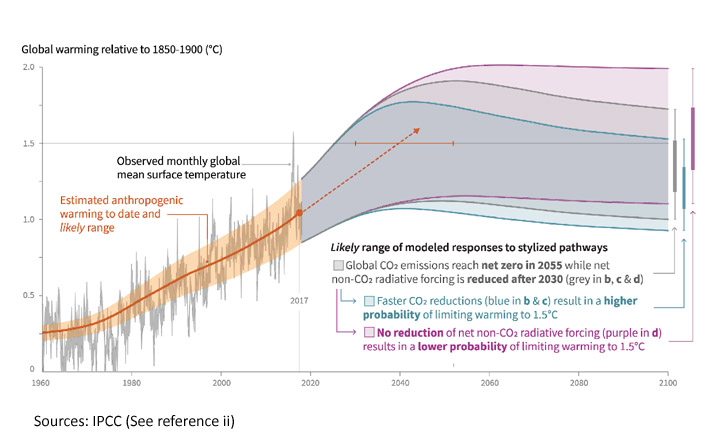
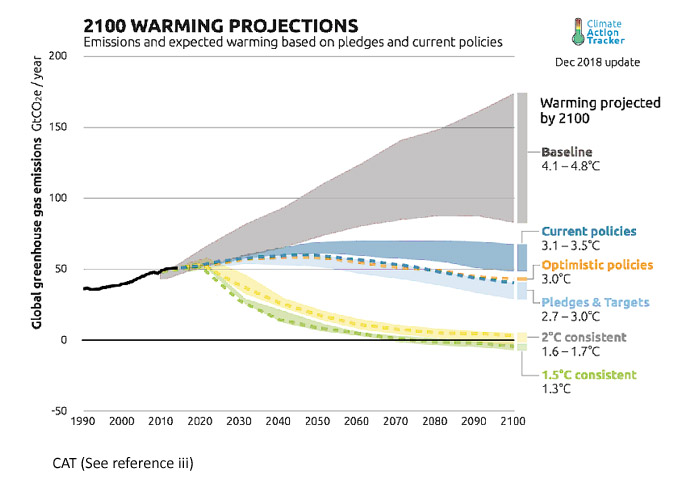
Impact of global warming on Bangladesh
For the period 1998-2017, the Global Climate Change Risk Index, 2019[iv] (GCCRI 2019) ranks Bangladesh as the seventh most impacted country by climate change. Yet, Bangladesh emitted just 0.36% of the world’s greenhouse gases in 2014.
A combination of several factors—subsidence of the Sundarbans area, uplift of its estuary beds due to large sediment deposits, tidal range amplification in the estuaries, and decrease of fresh water discharge—seem to have contributed to observed sea rise of 2.8-8.8 mm per annum and an increase of high water levels in the polder zones (low lying land enclosed by dikes) of 15.9-17.2 mm per annum[v]. The sea rise in the Sundarbans is significantly higher than the global average of 2.8-3.2 mm per annum[vi] observed for the period 1990-2009.
Recent research[vii] indicates that hydro-fracturing of Antarctica’s ice shelves and collapse of its ice cliffs, along with atmospheric warming, has the potential to double previously estimated sea rise by 2100. Due to above factors, studies [iii,vii], project sea rise in the Sundarbans to range between 2-4 m by 2100, as compared to a average global sea rise of ~1 m, without significant Antarctica ice melt; and ~2 m, with significant Antarctica ice melt.
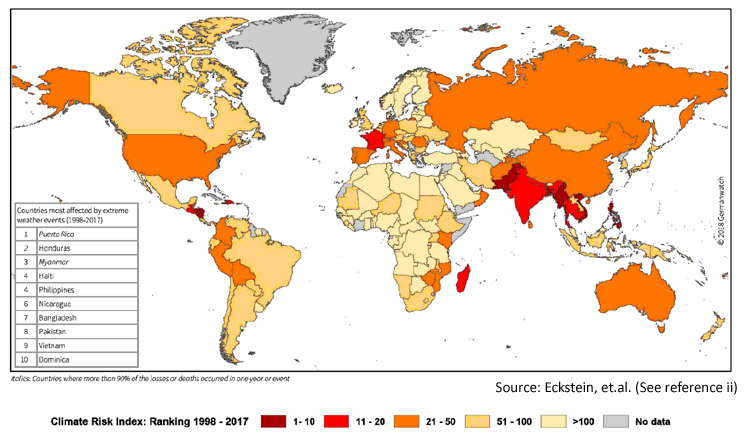
While it is not possible to draw an accurate map of the Sundarbans area in 2100, it is possible to draw 5 maps of the that area with a sea rise of 1 m to 5 m, at steps of 1 m sea rise for each map, and compare these maps with the current map of the Sundarbans. With a likely 3-5 m sea rise in the Sundarbans area, Bangladesh will lose 15-25% of its land mass by 2100.
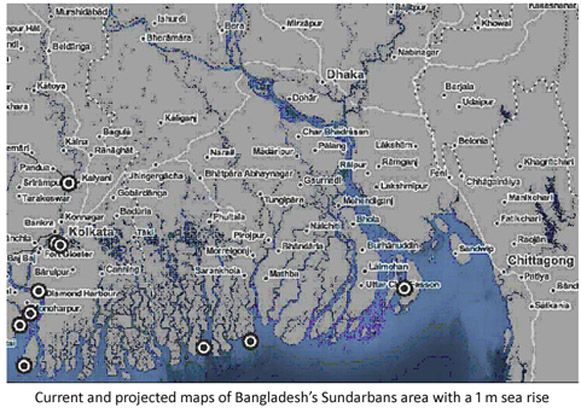
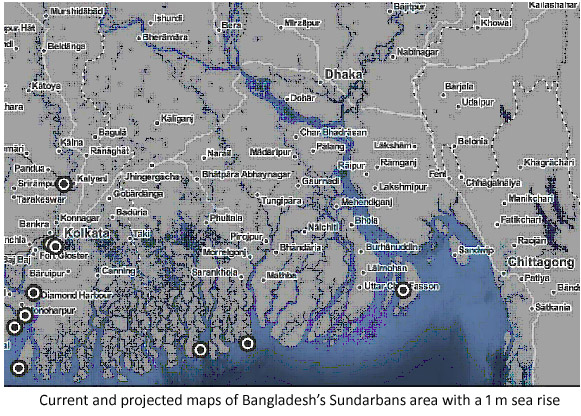
Sea ingress will turn surface and ground water sources in vast tracts of land saline. Agriculture, fisheries and other livelihoods will be affected. Human and animal habitats will be lost, and along with them domesticated animals and wildlife. As global temperatures rise, the intensity of cyclones hitting Bangladesh will increase, and there will be a greater number of extreme weather events. Existing and proposed projects in the Sundarbans area, e.g., the thermal power plant at Rampal, will be affected.
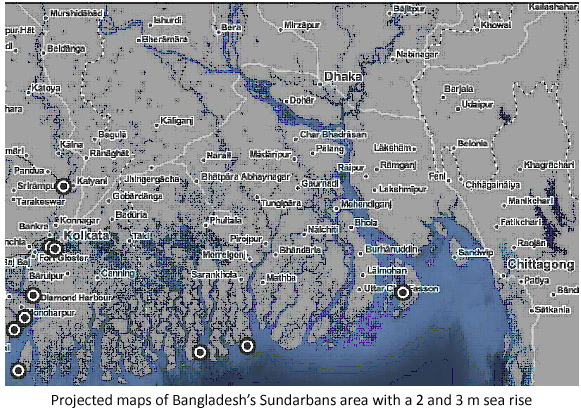
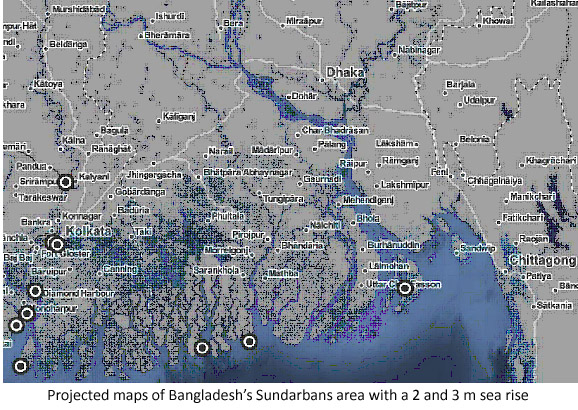
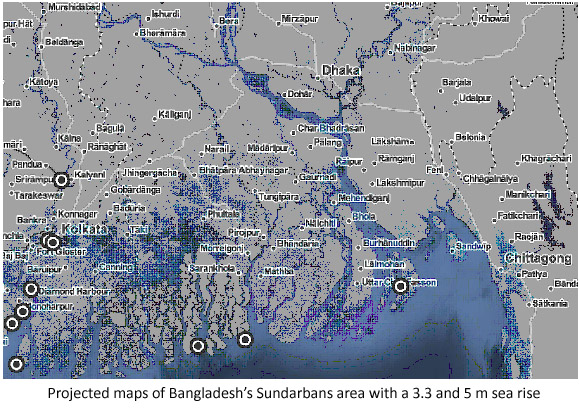
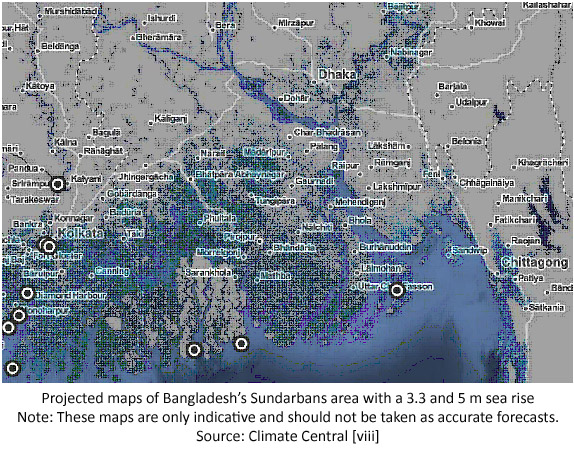
Mr Tariq Karim, former Bangladesh High Commissioner to India, estimates that 50 million Bangladeshi climate refugees would leave the country[ix] by 2050. That number will swell by the 21st Century end, and will trigger considerable stress and possibly conflict in South Asia.
Climate emergency
Climate change, if unchecked, can regress or even collapse human society. On 10 September 2018, UN Secretary General Antonio Guterres said in a speech he gave in New York, "Climate change is the defining issue of our time. We face a direct existential threat. If we do not change course by 2020, we risk missing the point where we can avoid runaway climate change, with disastrous consequences for people and all the natural systems that sustain us. I have spoken of the emergency we face."
As no single country can tackle global warming on its own and the measures taken so far, e.g., Kyoto Protocol, Paris Agreement, have been quite inadequate, we request the Bangladesh Government to consider taking the following steps immediately:
- Table a resolution in the United Nations to asking for a global climate emergency to be declared
Immediate measures
Some of the immediate measures we suggest at the Bangladesh and global levels are listed below. These are indicative measures and by no means exhaustive. Other measures may be added as considered appropriate.
Some of the immediate measures we suggest for Bangladesh to take to tackle global warming are:
-
Technology shifts: Shift to a) low energy systems that use renewable energy, e.g., solar energy with a significant amount of biomass, and b) renewable materials that are products of biomass.
- Compensation for CO2 sequestration: Appropriate compensation to be paid to those who sequester CO2, e.g., farmers.
- Reduce transport emissions: Phase out domestic air travel and ban private surface transport using fossil fuels by 2030 and develop public transport (rail and road).
- Shrink cities: By 2030, the maximum size of city agglomerate should be <5 million population and by 2040, <2 million.
- Soft borders: Bangladesh should come to an understanding with India to create a soft border. This will help reduce security forces, and therefore their fossil fuel consumption.
- Risk and opportunity equity: Measures should be taken to ensure that all Bangladeshi people should have the same opportunity and face the sane cumulative risk from natural and manmade hazards, no matter which part of the country they reside.
- Bangladesh citizen’s campaign: Create a Bangladesh citizen’s campaign to declare a global climate emergency. This organization will not only lobby with the Bangladesh Government and polity to have a climate emergency declared, but also oversee government action to see that it is taking the right steps and in time. An Indian campaign has been setup, and as a first step, a public petition is in circulation. Such a citizen’s campaign in Bangladesh may explore the possibility of collaborating and coordinating its activities with like-minded organizations in South Asia and other parts of the world.
The immediate measures that Bangladesh may table as part of its resolution to the UN may be:
- Sequester GHG emissions: Bangladesh should sequester its consumptive GHG emissions, including that of international travel and bunker fuels that originate from that country, completely in its territory by 2030.
- Sustainability index: Bangladesh should fulfill a sustainability index (SI) level of 0.1 by 2030, where SI is defined as the product of the fraction of energy and raw materials used by a country are renewable:
- SI for a country in a specific year = [Renewable energy used*/ Total energy used] x [Mass of renewable materials used/ Total mass of materials used]
(*1 J of solar energy used directly without an energy cost, e.g., as used by agriculture or drying clothes in the sun, will be given double the weight, i.e., 2 J, of solar energy harvested through PV or CSP technologies.)
- Degrowth: The global economy should shrink by ~55% for society to become sustainable.
- Differential growth/degrowth: Bangladesh should demand that USA and Canada need to shrink their economies by 90% and EU, Japan and Australasia by 75%.
- Compensation for lives lost and property destroyed due to global warming: All nations should share in paying just compensation for global warming-related injury to human lives and loss of property, and where possible restitution of damaged environment. The compensation payable by each nation should be proportional to its historic GHG consumption emissions.
- Climate refugees: Bangladeshi climate refugees should be allowed entry into countries that are the cause for global warming. Refugees may be absorbed by receiving countries in proportion to their historic GHG consumption emissions.
Notes
[ii] Intergovernmental Panel on Climate Change, 2018. Global Warming of 1.5oC
[iv] Eckstein, D., Hutfils, M., Winges, M., 2019. Global Climate Risk Index 2019, Germanwatch, Bonn. Downloaded on 17 Jan 2019 from: www.germanwatch.org/en/cri
[v] Pethick, J., Orford, J. D., 2013. Rapid rise in effective sea-level in southwest Bangladesh: Its causes and contemporary rates, Global and Planetary Change 111 (2013) 237–245.
[viii] Climate Central. Accessed on 19 Jan 2019 from http://sealevel.climatecentral.org/maps
